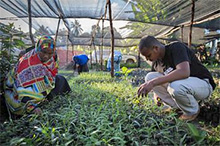OACPS works with partners to boost availability of food during COVID-19
 Brussels, 16 April 2020/ACP: In response to the global COVID-19 health crisis which is negatively impacting food and nutrition security throughout Africa, the Caribbean and the Pacific (ACP), the Organisation of African, Caribbean and Pacific States (OACPS) has undertaken measures to assuage the socio-economic impact of COVID-19 on actors along the value chains, notably family farmers and small and medium-sized enterprises (SMEs).
Brussels, 16 April 2020/ACP: In response to the global COVID-19 health crisis which is negatively impacting food and nutrition security throughout Africa, the Caribbean and the Pacific (ACP), the Organisation of African, Caribbean and Pacific States (OACPS) has undertaken measures to assuage the socio-economic impact of COVID-19 on actors along the value chains, notably family farmers and small and medium-sized enterprises (SMEs).
In Africa, the OACPS is working with the Pan African Farmers Organisation (PAFO) and the Comité de Liaison Europe-Afrique-Caraïbes-Pacifique (COLEACP), to reduce the impact of the health crisis on the agricultural production systems and food supply in OACPS Member States. The two Intra-ACP platforms, both beneficiaries of the 11th European Development Fund (EDF), jointly managed by the European Union (EU) and the OACPS, recently signed an Addendum to their ongoing Memorandum of Understanding, which will provide community, farm and company-level adapted information and training tools relevant to preventive health and safety measures. Both platforms will also continue to provide technical assistance to Farmers Organisations in Africa. In addition, the Addendum proposes to launch a detailed study of the effective impacts of COVID-19 in the short and medium term, in order to design effective contingency measures, recovery action plans and advocate for the mobilisation of resources to implement the plans.
These efforts are timely and very necessary given the impact of the COVID-19 Pandemic on productive capacity throughout Africa, coupled with the crisis resulting from the devastation caused by locust swarms in the Eastern African region which is expected to be aggravated during the current rainy season. It is estimated that some 9.75 million people living in areas affected by desert locusts in Ethiopia, Kenya and Somalia are currently or projected to be in a Phase 3 food crisis. OACPS Secretary-General, H.E. Georges Rebelo Pinto Chikoti, commended the two platforms for their prompt response to the OACPS initiative, saying, “This pandemic has made it even clearer that we live in an inter-connected world. Now, more than ever, we need to work together to safeguard the well-being of the citizens of the OACPS and do our best to maintain production and ensure food and nutrition security for all. These are undoubtedly severe challenges, but we need to see how, through collaborative action, we can address these to benefit our Member States.”
PAFO, in a recent statementcertified the commitment and responsibility of African farmers to continue to feed Africa while respecting the measures put in place by the World Health Organisation (WHO) and individual Governments in response to the current health crisis.
In the Caribbean, similar initiatives are being undertaken as the region seeks to galvanise local production to meet future demands. Ministers of Agriculture and other stakeholders met in a special session of the Council for Trade and Economic Development (COTED) in late March 2020 to consider the impact the Pandemic was likely to have on food and nutrition security in the region, given the its dependence on food imports and the unprecedented closure of borders and ports.
In early April 2020, the Pacific region was lashed by a late-season Category Five cyclone, Cyclone Harold, which in addition to the havoc created in the islands affected – Fiji, Solomon Islands, Tonga and Vanuatu, further reduced the region’s food security.
The OACPS is also working with the EU and the WHO to enhance country, regional and global health emergency preparedness beyond COVID-19 among at-risk OACPS Member States.
